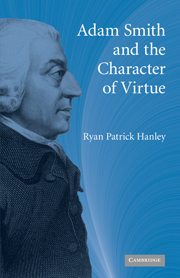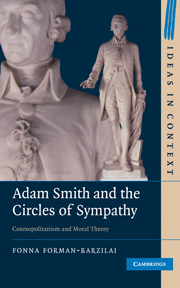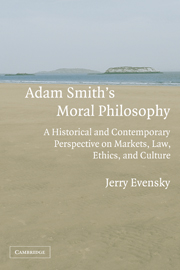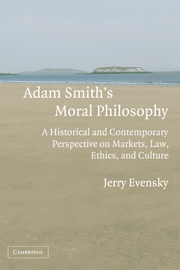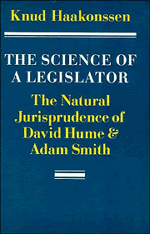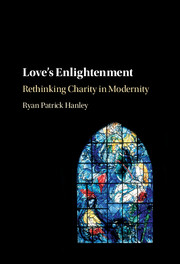Adam Smith and the Character of Virtue
Recent years have witnessed a renewed debate over the costs at which the
benefits of free markets have been bought. This book revisits the moral and
political philosophy of Adam Smith, capitalism’s founding father, to recover
his understanding of the morals of the market age. In so doing it illuminates
a crucial albeit overlooked side of Smith’s project: his diagnosis of the ethical
ills of commercial societies and the remedy he advanced to cure them.
Focusing on Smith’s analysis of the psychological and social ills endemic to
commercial society – anxiety and restlessness, inauthenticity and mediocrity,
alienation and individualism – it argues that Smith sought to combat corruption
by cultivating the virtues of prudence, magnanimity, and beneficence.
The result constitutes a new morality for modernity, at once a synthesis of
commercial, classical, and Christian virtues and a normative response to one
of the most pressing political problems of Smith’s day and ours.
Ryan Patrick Hanley is Assistant Professor of Political Science at Marquette
University. His research in the history of political philosophy has appeared in
the American Political Science Review, the American Journal of Political Science, the
Review of Politics, History of Political Thought, the European Journal of Political
Theory, and other academic journals and edited volumes. He is also the editor
of the forthcoming Penguin Classics edition of Adam Smith’s Theory of Moral
Sentiments, featuring an introduction by Amartya Sen, and a co-editor, with
Darrin McMahon, of The Enlightenment: Critical Concepts in History.
- Was the first book-length study of Smith's conception of virtue
- Breaks ground on trajectory of Smith's thought, and his intentions in revising the Theory of Moral Sentiments
- Written in a clear, jargon-free style accessible to a wide readership in a range of disciplines - political science, philosophy, history, economics and psychology
Reviews & endorsements
“Ryan Patrick Hanley’s excellent Adam Smith and the Character of Virtue succeeds in bringing a fresh perspective to the study of Smith’s works. It offers a brilliant reinterpretation of Smith’s moral philosophy that not only unifies Smith’s work but offers larger lessons for us today. In an increasingly crowded field, Adam Smith and the Character of Virtue distinguishes itself as one of the most important books on Smith in more than a decade.”
– James Otteson, Yeshiva University
“An original view of Adam Smith, arguing that he goes beyond self-interest and sympathy to the nobility of classical virtue. Ryan Hanley shows calm intelligence, fairness, and accuracy in this impressive new interpretation.”
– Harvey Mansfield, Professor of Government, Harvard University
“The great originality of Ryan Hanley’s book is twofold: first it exhibits Smith’s pervasive, surprising, and previously ignored focus on ‘nobility.’ Even more surprising is that Hanley is persuasive in explaining how in deploying this concept, Smith attempts to merge Christian and Pagan virtues appropriate to commercial times. Second it shows that Smith offers his readers a program of self-actualization that can transform their various manifestations of self-love into socially beneficial activities. In the process, Hanley puts to rest the idea that Smith was sanguine in relying on market forces or the invisible hand alone. Moreover, Hanley shows how Smith capitalized on humanity’s religious longings. Hanley wisely avoids the question about Smith’s religious views and focuses on Smith’s treatment of the role(s) of religion in commercial society. By letting Smith regularly engage with Aristotle, Rousseau, and Tocqueville, Hanley makes Smith seem like a helpful and instructive companion in a world where the victory of Liberalism and Enlightenment are not to be taken for granted. Along the way, Hanley articulates a detailed account of Smith’s intellectual development over time.”
– Eric Schliesser, Leiden University, editor of New Voices on Adam Smith
"Hanley's explanation of the importance of the heavily revised sixth edition of The Theory of Moral Sentiments to Smith's thought is provocative, and his analysis of the way Smith melded a defense of the virtues of prudence, benevolence, and magnanimity is compelling."
-CHOICE, E. J. Harpham, University of Texas at Dallas
Product details
June 2009Hardback
9780521449298
242 pages
229 × 152 × 17 mm
0.48kg
Available
Table of Contents
- Introduction
- 1. The problem: commerce and corruption
- 2. The solution: moral philosophy
- 3. Interlude: the what and the how of TMS VI
- 4. Prudence, or commercial virtue
- 5. Magnanimity, or classical virtue
- 6. Beneficence, or Christian virtue
- Epilogue.

